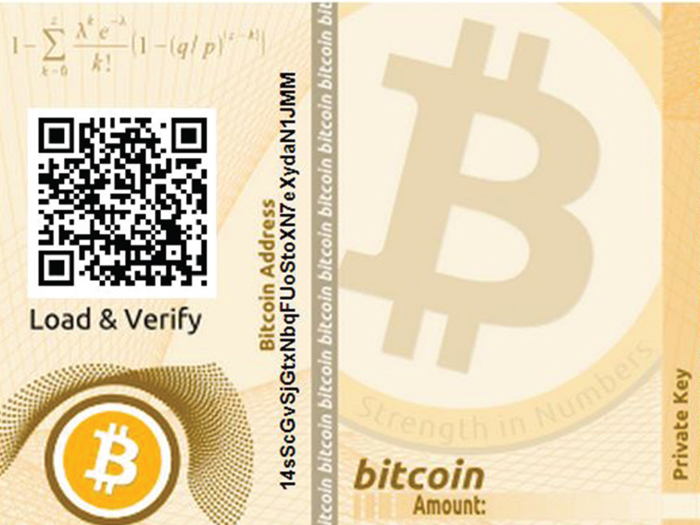Digital Currency
Befuddled by Bitcoin?

Five years after the emergence of bitcoins, consumers are using them to buy everything from pizza to cars, from drugs to real estate. Political donations can even be made in bitcoin. Just about every day, companies are announcing they will accept this “digital cash.”
Like traditional currency, bitcoins facilitate the exchange of goods or services. The advantages of bitcoin are fast payments worldwide with very low transaction costs. International monetary transactions can take three days to clear, whereas bitcoin transactions are considered settled after just one hour.
Credit card transaction fees are roughly 2 percent of the purchase price, while the minimum bitcoin transaction fee is 0.001 of the bitcoin’s value.
Video: New York State Superintendent of Financial Services Benjamin Lawsky on the future of digital currency regulation.
Using bitcoin is somewhat similar to online banking. Software known as a “wallet” stores bitcoin addresses (similar to an account number) and handles transactions. The wallet can reside on any computing device, or on a website known as a “web wallet.” Wallets securely store bitcoin using encryption and can send them to an individual or company for payment.
Wallets connected to the Internet and used for transactions are called “hot wallets.” Wallets stored on devices without Internet connections are “cold wallets.” A cold wallet can be stored on a stand-alone USB device, for example. Similar to an online bank account, the user name and password must be protected from unauthorized access to protect the bitcoins within the wallet.
How Does Bitcoin Work?
Bitcoin does not have banks that log transactions or track how many bitcoins are held in individual accounts. Instead, the bitcoin network uses a “block chain” to perform these functions openly and publicly.
The block chain is a public ledger containing all confirmed transactions. The integrity and chronological order of the block chain is maintained with encryption provided by the bitcoin network. User identities are protected by recording the bitcoin address in the ledger instead of user names. As long as bitcoin users do not identify themselves as the owner of a bitcoin address, their transactions remain anonymous.
No single entity or central bank controls the bitcoin network or sets economic policy. Instead, bitcoin users control the bitcoin network, with a subgroup of bitcoin “miners” who use their computers to process transactions and add them to the block chain by “mining.”
Roughly every 10 minutes, the bitcoin network bundles recent transactions and sends them to the miners. The miners’ computers perform complex calculations or “proofs of work” that require billions of calculations per second, turning the effort into a type of lottery.
The first miner to satisfy the proof of work is rewarded in bitcoins. This incentive motivates miners to participate in the bitcoin network.
As the bitcoin network grows in computing power, it automatically adjusts the difficulty of the proof of work to ensure the calculations take roughly 10 minutes. This keeps mining competitive and ensures that no single individual or entity can control the network.
The transactions, combined with the proof of work and control data, are now a block in the chain. The calculations for the proof of work are based off the previous block in the chain to enforce chronological order.
As more blocks are added to the chain, it becomes increasingly difficult to reverse previous transactions since all subsequent blocks would require recalculation.
Bitcoin Risks
As with any emerging technology, this new practice brings associated — and sometimes uncharted — risks.
Like cash, a lost bitcoin is lost forever. There is no recourse to recover the money if the password to a bitcoin wallet is forgotten. The same is true if the wallet is corrupted due to hardware failure, or if the USB storage device containing a cold wallet is lost. Having good backups of the wallet is critical.
Additionally, bitcoin transactions are not reversible. Once a transaction has been confirmed in the block chain, it cannot be undone. This benefits merchants since chargeback fraud, (e.g., when someone purchases an item with their credit card, then petitions their credit card company for a refund claiming they never received the item), is not possible.
By the same token, unscrupulous companies may keep the bitcoin and never fulfill an order.
Like cash, a lost bitcoin is lost forever. There is no recourse to recover the money if the password to a bitcoin wallet is forgotten.
Acting too fast could result in lost payment. Bitcoin transactions can occur nearly instantly, however, blocks are added to the block chain every 10 minutes; it takes at least that long for the transaction to be confirmed by the bitcoin network.
If an order is fulfilled before the transaction is confirmed, a company may find that product has been shipped, but payment never occurred. For particularly large transactions, waiting until several blocks are added to the chain may be wise.
Bitcoin value is volatile. Bitcoin values have risen and fallen significantly over the last two years. This makes storing value in bitcoins somewhat of a gamble. Many companies that accept bitcoins immediately exchange them for local currency, protecting their organizations from potentially dramatic price swings.
Malware can steal bitcoins. Computer processing power can be stolen to mine for bitcoins. Such malware has been found on computers, tablets and cell phones. Such malware can also attack the wallet software itself and potentially drain the wallet of any bitcoins it contains.
Bitcoins can be lost to theft or exchange failure. In early 2014, hackers exploited weaknesses in several bitcoin exchange websites. By sending many copies of the same bitcoin payment, a vulnerable exchange sent out the requested bitcoins repeatedly.
Using this technique, hackers stole thousands of bitcoins, worth millions of dollars. Unable to return bitcoins to their customers, the hacked exchanges closed. Since there is no FDIC-like insurance protecting users, the only remedy is through the legal system.
Transactions may be anonymous, but they are recorded. Bitcoin is popular with criminals since their identities are protected. However, every transaction is recorded in the public ledger and IP addresses are recordable by Internet service providers.
This makes it possible for law enforcement agencies to reconstruct past bitcoin transactions if a user’s identity can be matched with a bitcoin address. Once the identity is matched, the criminal’s entire history of bitcoin use becomes available.
A company may not wish to have its customer list revealed to others. It might be a competitive disadvantage or perhaps the company might lose customers (especially if it is in a socially gray area where customer privacy is greatly valued).
Regulations Vary
Laws and regulations are still emerging. In the United States, various federal and state agencies disagree on how to classify bitcoins and regulate their use.
At the federal level, for example, the IRS is treating bitcoin as property, not currency. This means that capital gains and losses must be calculated and reported for tax purposes, thereby complicating everyday use since every purchase requires accounting documentation.

Joe Budzyn, assistant vice president and senior business development manager, OneBeacon Technology Insurance
Most states have not adopted a regulatory approach to digital currency. Texas has issued a regulatory guidance on its decision to not treat bitcoin as currency. As of this writing, New York is developing virtual currency exchanges, while Florida is applying existing laws to bitcoin exchanges, particularly money-laundering laws.
Until government agencies fully decide exactly what bitcoin is, insurers are unlikely to feel comfortable offering standardized coverage. Pending that, companies seeking insurance can inquire about customized offerings.
Internationally, the legal landscape is just as complicated, with many laws in development.
Some countries, such as Iceland, have restricted the foreign exchange of bitcoin. Others, such as Ecuador, have banned the currency. China has barred its financial institutions from transacting in bitcoin, while India has advised the public to avoid buying and selling virtual currencies.
Given all of the media coverage that bitcoin receives, it is important to remember that it emerged only five years ago. Will bitcoin revolutionize the financial world? Or will it join other valueless currencies only found in history books? It’s too soon to know for certain.
Should a company accept bitcoin as payment today? If approached thoughtfully, accepting bitcoin can be a differentiator in today’s competitive marketplace.
If implemented poorly, accepting bitcoin can be risky. Taking appropriate steps to minimize risks allows companies to adopt virtual currencies and attract the growing user base.
And if nothing else, being educated about virtual currencies ensures each company will be prepared for the future — whichever direction it may take.
Lloyd Takata is executive vice president of OneBeacon Technology Insurance. JOE BUDZYN is the organization’s assistant vice president and senior business development manager. They can be reached at [email protected].











